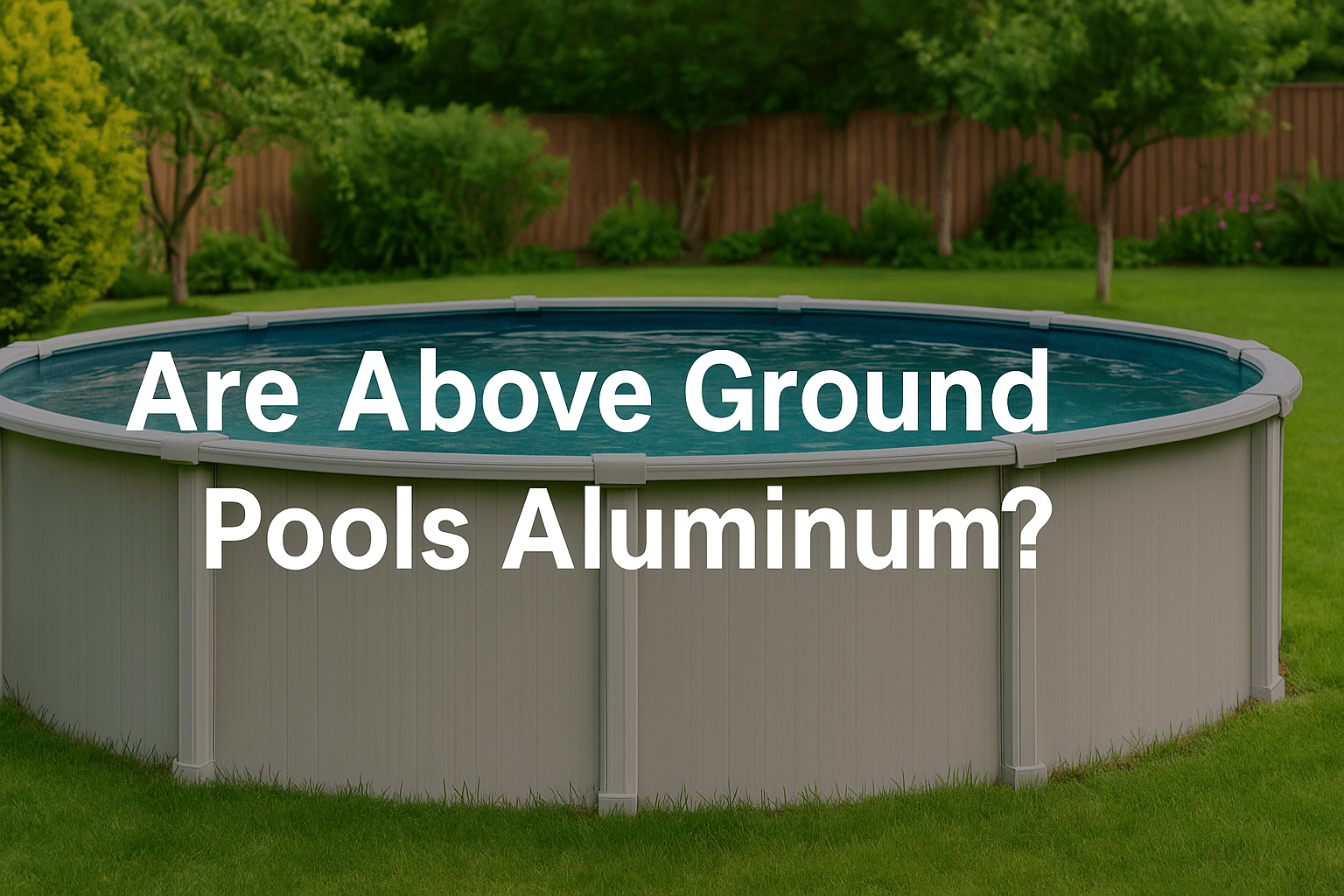
Are Above Ground Pools Aluminium?
Thinking of getting an above ground pool installed and wondering if it's made of aluminium? Short answer: sometimes—many are, thanks to aluminium’s rust resistance and strength. But it's not the only option. Steel and resin are in the mix too. Curious which is best for your garden? Let’s dive in.
Are Above Ground Pools Steel or Aluminium? Understanding Frame Materials
When you're planning to install an above ground pool, one of the first questions that comes up is: what is it actually made of?
Turns out, the frame material matters a lot. It impacts how long the pool lasts, how much maintenance it needs, and how well it copes with British weather.
Let’s break down the three main contenders.
The Core Materials: Steel, Aluminium, and Resin
Pools aren’t just inflatable toys anymore. They’re solid garden features—and what they’re made from can make all the difference.
Steel: The Traditional and Strong Choice
Characteristics of Galvanised Steel Walls and Frames
Steel pools usually feature galvanised or coated steel to help fend off rust. It’s the material you’ll see in lots of older models, and it’s known for its strength and solid feel.
Advantages (Strength, Affordability)
Steel is sturdy. It can take a knock, and it’s usually more affordable than other materials, making it a solid choice if you're on a tighter budget.
Disadvantages (Rust Potential, Weight)
That said, steel doesn’t love moisture. If that galvanised layer wears down, rust creeps in. It’s also heavy, so installation can take more time and muscle.

Aluminium: The Rust-Resistant Alternative
Characteristics of Aluminium Walls and Frames
Aluminium pools are lighter and naturally resistant to rust. That’s a huge win in the UK, where wet weather is part of the deal.
Advantages (Corrosion Resistance, Lightweight, Flexibility)
They're easy to move, easier to install, and ideal for coastal areas or damp gardens. The flexibility of aluminum also helps it expand and contract with seasonal changes.
Disadvantages (Higher Cost, Potential for Oxidation/Pitting, Perceived Flexibility)
They do cost a bit more. And while they don’t rust, they can oxidise—which might leave a white chalky film. Some people also feel they flex a bit too much compared to steel.
Resin: The Modern, Corrosion-Proof Option
Characteristics of Resin Components (often with metal walls)
Resin pools usually mix materials—resin frames with metal walls. Think of it as a hybrid with modern flair.
Advantages (Rust-Proof, UV Resistance, Cooler to Touch)
Resin doesn’t rust. It stands up well to the sun and doesn’t get too hot to touch. If your kids are constantly leaning on the edges, this could be a game-changer.
Disadvantages (Higher Cost, Can Be Brittle in Extreme Cold)
But like anything, it’s not perfect. Resin can be more expensive and in freezing conditions, it can go brittle. Not ideal for harsh winters unless you store it properly.

Comparing Steel vs. Aluminium for Your Above Ground Pool
Now that we know what’s out there, how do steel and aluminium really stack up?
Durability and Lifespan Considerations
Rust vs. Oxidation/Corrosion: Understanding the Differences
Steel rusts. Aluminium oxidises. Rust can eat through steel if left unchecked, while aluminium's chalky film is mostly cosmetic.
Impact of Coatings and Manufacturing Processes on Longevity
Modern coatings like galvanisation and anodising help all three materials go the distance. But quality varies. That bargain pool on sale might be cheap for a reason.
Suitability for Saltwater Systems
If you’re thinking of a saltwater setup, aluminum and resin are your best bets. Steel doesn't always play nice with salt.
Strength and Structural Integrity
How Each Material Handles Water Pressure and Movement
Steel holds firm under pressure. It’s rigid and feels solid. Aluminium has more give—which can help it absorb movement without cracking.
Resistance to Dents and Wear
Steel takes more hits without denting. But it’s heavier and needs more protection. Aluminium dents easier, but shrugs off corrosion.
Cost, Weight, and Installation
Upfront Purchase Price Comparison
Here’s a quick breakdown:
-
Steel: £1,000 to £2,500
-
Aluminum: £1,500 to £3,000
-
Resin: £2,000 to £4,000
Ease of Handling and Assembly
Aluminium wins here. It’s lighter and simpler to assemble, especially for DIY setups. Steel takes more effort and may need help from mates or pros.
Impact on Shipping and Labour Costs
Because aluminium is lightweight, it usually costs less to ship and install. Steel’s added weight can push up the price if you're paying for help.

Hybrid Designs and Making the Best Choice
The Rise of Hybrid Pool Structures
Combining Steel Walls with Resin Components
More and more brands are mixing materials. Steel walls offer strength, while resin tops and rails protect against corrosion.
Leveraging Strengths of Different Materials for Optimal Performance
The goal? Balance. A hybrid gives you the rigidity of steel with the rust-proof benefits of resin or aluminium.
Factors to Consider When Choosing Your Pool Material
Your Climate and Environment (Humidity, Salt Exposure)
In wetter regions or near the sea? Aluminium or resin are your friends. Steel needs extra care in salty or humid climates.
Budget and Long-Term Maintenance Expectations
Cheap now can cost more later. Aluminium and resin need less TLC over time, even if they cost more up front.
Manufacturer's Warranty and Reputation
Look at reviews. A decent warranty shows confidence from the brand. Some budget options don’t come with much backup.
Intended Use and Desired Lifespan
Are you planning on years of family fun or just a few summer dips? Go long-term with aluminium or resin if you're thinking ahead.
Still not sure which pool type is right for your garden?
If rust gives you nightmares, aluminium or resin is a smart bet. Steel might save you some pounds at first, but it asks for more love later on.
Whatever you choose, the right material can make all the difference when it comes to splashes, laughs, and low-stress summer days.
Have you checked out our other posts?
Are Above Ground Pools Fiberglass?
What Are Above Ground Pools Made Of?


Leave a comment